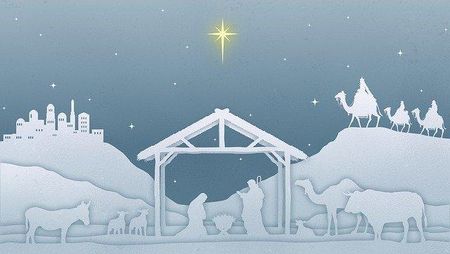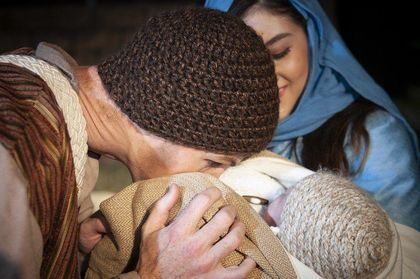What does Matthew teach us about Christmas?
 Photo: Pixabay (CC0)
Photo: Pixabay (CC0)
Today we aim to extract eight important lessons from Matthew 1:18-20 so as to rejoice in the mercy of the Most High this Christmas season.
The text reads thus:
“Now the birth of Jesus Christ was on this wise: “When as his mother Mary was espoused to Joseph, before they came together, she was found with child of the Holy Ghost.
Then Joseph her husband, being a just man, and not willing to make her a public example, was minded to put her away privately.
“But while he thought on these things, behold, the angel of the Lord appeared unto him in a dream, saying: Joseph, son of David, fear not to take unto yourself Mary your wife: for that which is conceived in her is of the Holy Ghost”.
Praise God for the incarnation!
Now here are the eight observations:
Firstly:
Matthew’s goal in writing his Gospel is to convince his fellow Jews that Jesus of Nazareth is the Christ, the prophesied Messiah.
This explains why he pens the first seventeen verses showing that Jesus is both the “son of Abraham” and the “son of David”.
In verse 18, the action commences. By means of the virginal conception, Matthew highlights how Jesus is the fulfilment of a messianic prophesy registered in Isaiah 7:14, “Behold, a virgin shall be with child, and shall bring forth a son, and they shall call his name Emmanuel”.
Secondly:
As well as pointing out that Jesus is the messiah, the text also reveals that Jesus is “more than” the Christ. According to the promise of Isaiah 7:14 Jesus would be Emmanuel, that is: “God with us”.
Jesus Christ is God. He is the second person of the blessed Trinity. Matthew 1:21 also indicates that Christ is divine as he was given the name Jesus so as to save his people from their sins.
But who can save except God? Who can forgive sins but the Almighty? What Matthew wants to make clear from the outset is that Jesus is much more important than the messiah. He is God incarnate! Wow!
 Millions of Christians around the world celebrate Jesus' birth in this month of December. / Pixabay.
Millions of Christians around the world celebrate Jesus' birth in this month of December. / Pixabay.
Thirdly:
Since Jesus was born of Mary, we can defend the doctrine of the humanity of Christ. The Jesus of Scripture is not some kind of ghost-like figure as in Docetism.
If Christ had not assumed a human nature, he could not have redeemed Adam’s fallen descendents.
Fourthly:
Another important detail is that the work of the Spirit of God in conceiving baby Jesus helps us appreciate the impeccability of Christ. Jesus was born of Joseph’s seed.
Therefore he did not inherit a sinful nature. If Christ were a sinner, he could not be our Redeemer.
Now, whilst it is true that Joseph did not beget Jesus, could Christ not have inherited the sinful nature of his mother, Mary?
It is here where the Vatican appeals to the fictitious doctrine of the ‘Immaculate Conception’, accepted as Roman dogma in 1854, which professes that Mary herself was born without original sin.
The New Testament, however, begs to differ. Not only does it teach that Mary was a sinner but it does not answer the question regarding the relationship between Jesus’ impeccability and the sinfulness of his mother.
A sober answer would be to state that God, in some sovereign manner, protected his beloved Son from being polluted by Mary’s sin.
 God, in some mysterious fashion, protected baby Jesus from being affected by the sin of his mother. / Pixabay.
God, in some mysterious fashion, protected baby Jesus from being affected by the sin of his mother. / Pixabay.
Fifthly:
Some interpret the conception of Christ as a so-called “second creation”, that is, Jesus is born as the Second Adam. Just as Adam was not born of man, neither was Christ.
God, in the beginning, created Adam from the virgin land of Eden. Here, in the incarnation, the virgin ground is Mary. And where the first woman was taken from a man; now the Second Man is taken from a woman.
Sixthly:
In the passage we also learn how the Holy Spirit is able to produce life in the virgin’s womb. In this sense, Matthew is faithful to the doctrine of the Spirit taught in Job and Psalms because there the creating power of the Spirit is stressed.
By emphasizing Jesus’ birth of the Spirit, the apostle proves that the Holy Spirit is God as only God can create life where none exists.
Seventhly:
There is an additional proof in the text that draws our attention to the deity of the Spirit, namely, the designation “Holy Spirit” (vv. 18, 20). Who is holy but God?
The expression “Holy Spirit” was not invented by Matthew but came from Israel’s Old Testament (Psalm 51:11 and Isaiah 63:10).
Eighthly:
One final observation is how the Spirit works via physical realities such as human bodies. If the Spirit wrought the incarnation, then he is in contact with the world of flesh and blood.
The Spirit cannot be relegated to the sphere of the human mind or spirit.
 Without the Holy Spirit, the incarnation would have been impossible./ Pixabay.
Without the Holy Spirit, the incarnation would have been impossible./ Pixabay.
CONCLUSION
Regarding Christ, we can note how he is: the messiah, God, man, impeccable and the Second Adam.
With respect to the Spirit: he creates therefore he is God, he is holy therefore he is God and he does not only work in the “spiritual” realm but also within the physical sphere.
Once more: praise be to God Almighty for the miracle of Christmas!
Merry Christmas to all you followers of Evangelical Focus!

Las opiniones vertidas por nuestros colaboradores se realizan a nivel personal, pudiendo coincidir o no con la postura de la dirección de Protestante Digital.
Si quieres comentar o